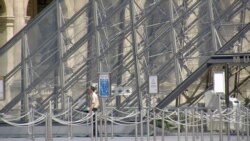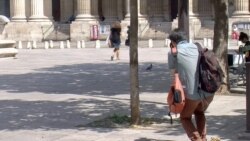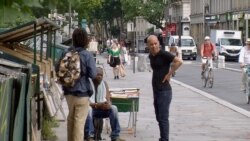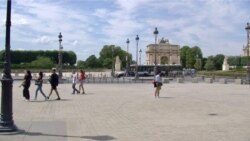Paris-based author and travel guide Rosemary Flannery has lived through the highs and lows of the tourist business here, buffeted by terrorist attacks, yellow vest protests — and now the coronavirus.
“It was a big shock to find out in March that everything was cancelled,” Flannery said of travel bans issued on both sides of the Atlantic, as the numbers of coronavirus cases began shooting up.
For Flannery, a native New Yorker who has added on French nationality, it has meant that a mainstay of her walking tours and museum visits has vanished: Americans.
“All the people who were to come for Easter break, everybody who was to come for the summer -- even those who were going to come in September -- all cancelled," she said.
Now, with coronavirus cases under control across large swathes of the continent, the EU is cautiously opening its borders to visitors from a short list of 14 safe countries.
Tunisia, Canada, Japan and Georgia have made the cut. So has China -- bringing the list to 15, if Beijing reciprocates by welcoming European visitors.
Off the list is every other nation, including Brazil and Russia — along with what has traditionally been Europe’s closest ally, the United States, where coronavirus cases are back on the rise after a dip during the spring.
European officials say the list is based on epidemiological concerns and reciprocity considerations, and will be revised regularly to add, but also strike off countries, as situations change.
Yet their decision also underscores the very different trajectories the two regions are on — not just in dealing with the pandemic. With Europe and the United States sometimes vying to acquire masks and promising medications for their citizens, not to mention future vaccines, coronavirus is also accentuating a widening transatlantic divide, some analysts say.
The EU’s travel list “can be seen as an explanation that Europe was not very impressed by the measures taken by the U.S.” in fighting the virus, said Sebastien Maillard, director of the Paris-based Jacques Delores Institute research group. “But also there is some reciprocity; if the U.S. keeps its ban on Europeans, then we will keep ours as well.”
Missing in Paris: American tourists
Last week. in an apparent bid to downplay concerns, Secretary of State Mike Pompeo said the U.S. and Europe are working together to ensure that both open up safely.
“It’s a challenge for all of us to decide how and when to open up our economies and our societies. Everybody’s trying to figure that out,” Pompeo said during a video conference organized by the German Marshall Fund research institute. “We’re working with our European counterparts to get that right.”
In the French capital, the absence of American tourists these summer months is striking, and deeply felt. For decades, they have helped to shape the city’s history and culture — from Left Bank cafes like Les Deux Magots, a favorite watering hole of 20th-century writer Ernest Hemmingway, to jazz clubs, book stores and breakfast joints.
They are also a major source of revenue, counting among the top foreign visitors in Paris, where tourism employs nearly 10 percent of the area workforce.
“American tourists are great, honestly I think they’re the best,” tour guide Flannery said. “They love Paris. They’re crazy about France. They’re very delighted by everything — by the savoir vivre, by the food, by the (Seine) river, by the beauty of the architecture.”
Flannery has seen other downturns, including after terrorist attacks in the U.S. and France, in 2001 and 2015, respectively.
“After 9/11, for about three years Americans didn’t like to get on a plane,” she says. “This is a different type of catastrophe, but there are similarities.”
Mask piracy and other tensions
As coronavirus cases surged in places like Italy and France in early March, Washington barred most European travelers from entering. The move sparked chaos in airports, and the European Union responded shortly after with a travel ban of its own.
As both regions scrambled to import masks and other equipment, several local European officials accused the United States of diverting supplies they had ordered for their own citizens – allegations the U.S. denied. Berlin’s interior secretary even accused the Americans of “mask piracy.”
In France, the government described it as “unacceptable” last month for French pharmaceutical giant Sanofi to prioritize American markets with any COVID-19 vaccine it developed – a scenario the company’s head appeared to suggest, because of generous U.S. research investment.
Washington was again in the spotlight this week, following reports it had secured nearly all the existing stock of a promising coronavirus drug called remdesivir.
While poorer countries will reportedly be able to make a generic version of it under a deal between the U.S. government and its California manufacturer, European and other wealthier nations will not have immediate access to it.
Europe is also feeling caught in the middle of U.S.-China tensions that have sharpened with the pandemic, analyst Maillard said, stoking sentiments that the continent wants to be an “independent geopolitical actor.”
“When we needed protective equipment, when we needed a vaccine — when the U.S. was trying to come in to buy it at a better price or to take over a company — we didn’t feel treated like allies,” he added. “So now I think the Europeans are more conscious they need to get on their way on their own.”










